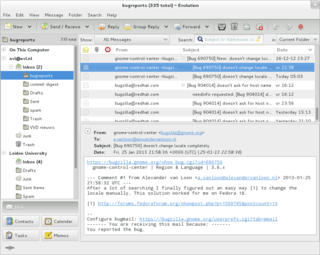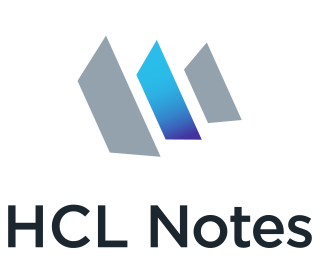
Electronic mail is a method of transmitting and receiving digital messages using electronic devices over a computer network. It was conceived in the late–20th century as the digital version of, or counterpart to, mail. Email is a ubiquitous and very widely used communication medium; in current use, an email address is often treated as a basic and necessary part of many processes in business, commerce, government, education, entertainment, and other spheres of daily life in most countries.

HCL Notes is a proprietary collaborative software platform for Unix (AIX), IBM i, Windows, Linux, and macOS, sold by HCLTech. The client application is called Notes while the server component is branded HCL Domino.
Lotus Software was an American software company based in Massachusetts; it was sold to India's HCL Technologies in 2018.
The Melissa virus is a mass-mailing macro virus released on or around March 26, 1999. It targets Microsoft Word and Outlook-based systems and created considerable network traffic. The virus infects computers via email; the email is titled "Important Message From," followed by the current username. Upon clicking the message, the body reads, "Here's that document you asked for. Don't show anyone else ;)." Attached is a Word document titled "list.doc," containing a list of pornographic sites and accompanying logins for each. It then mass-mails itself to the first fifty people in the user's contact list and disables multiple safeguard features on Microsoft Word and Microsoft Outlook.

Outlook Express, formerly known as Microsoft Internet Mail and News, is a discontinued email and news client included with Internet Explorer versions 3.0 through 6.0. As such, it was bundled with several versions of Microsoft Windows, from Windows 98 to Windows Server 2003, and was available for Windows 3.x, Windows NT 3.51, Windows 95, Mac System 7, Mac OS 8, and Mac OS 9. In Windows Vista, Outlook Express was superseded by Windows Mail.

ZDNET is a business technology news website owned and operated by Ziff Davis. The brand was founded on April 1, 1991, as a general interest technology portal from Ziff Davis and evolved into an enterprise IT-focused online publication. After being under the ownership of CNET Networks (2000–2008), CBS Corporation/ViacomCBS (2008–2020), and Red Ventures (2020–2024), ZDNET was reacquired by Ziff Davis in August 2024. CNET was included in the acquisition as well.
Messaging Application Programming Interface (MAPI) is an API for Microsoft Windows which allows programs to become email-aware. While MAPI is designed to be independent of the protocol, it is usually used to communicate with Microsoft Exchange Server.
The following tables compare general and technical features of notable non-web-based email client programs.
OfficeVision was an IBM proprietary office support application.
Nitix was a retail Linux distribution, produced in Canada. The software is developed by Net Integration Technologies, Inc., which has been acquired by IBM as of January 2008 and currently operates as IBM Lotus Foundations.
HCL iNotes offers a full-featured web-based version of HCL Technologies's HCL Notes client. Formerly known as IBM Lotus Domino Web Access, HCL iNotes provides HCL Notes users with browser-based access to their HCL Notes mail, calendar, and contacts. The software combines with HCL Domino software to provide a client interface that is available both online and offline. It provides access to collaboration tools using a variety of Web browsers across multiple platforms.

J2 Global, Inc. was an American technology holding company based in Los Angeles, California. The company provided Internet services through two divisions: Business Cloud Services and Digital Media.

Jose A. Rodriguez Jr. is an American former intelligence officer who served as director of the National Clandestine Service of the Central Intelligence Agency (CIA). He was the final CIA deputy director for operations (DDO) before that position was expanded to D/NCS in December 2004. Rodriguez was a central figure in the 2005 CIA interrogation videotapes destruction, leading to The New York Times editorial board and Human Rights Watch to call for his prosecution.
During the 2007 Congressional investigation of the dismissal of eight U.S. attorneys, it was discovered that administration officials had been using a private Internet domain, called gwb43.com, owned by and hosted on an email server run by the Republican National Committee, for various official communications. The domain name is an abbreviation for "George W. Bush, 43rd" President of the United States. The use of this email domain became public when it was discovered that Scott Jennings, the White House's deputy director of political affairs, was using a gwb43.com email address to discuss the firing of the U.S. attorney for Arkansas. Communications by federal employees were also found on georgewbush.com and rnchq.org. Congressional requests for administration documents while investigating the dismissals of the U.S. attorneys required the Bush administration to reveal that not all internal White House emails were available. Conducting governmental business in this manner is a possible violation of the Presidential Records Act of 1978. Over 5 million emails may have been lost. Greg Palast claims to have come up with 500 of the Karl Rove emails, leading to damaging allegations. In 2009, it was announced that as many as 22 million emails may have been lost.
Bynari is a defunct company based in Dallas, developing server and email software, mainly known for its Insight Family, similar to Microsoft Exchange Server with Outlook.

IBM Lotus Symphony is a discontinued suite of applications for creating, editing, and sharing text, spreadsheet, presentations, and other documents and browsing the World Wide Web. It was first distributed as commercial proprietary software, then as freeware, before IBM contributed the suite to the Apache Software Foundation in 2014 for inclusion in the free and open-source Apache OpenOffice software suite.
Courier was an email client for Microsoft Windows. The software was originally released in 1996 as Calypso by Micro Computer Systems (MCS).

Outlook.com, formerly Hotmail, is a free personal email service offered by Microsoft. This includes a webmail interface featuring mail, calendaring, contacts, and tasks services. Outlook can also be accessed via email clients using the IMAP or POP protocols.
IBM Notes Traveler is a software, a push-email product which provides access to email and Personal Information Management (PIM) application for IBM Notes customers using supported mobile devices. Version 9.0 supports Android 2.x, 3.x, and 4.x; Apple iPhone and iPad; Microsoft Windows Mobile 5 and 6; Windows Phone 7 and 8; Windows RT; Blackberry 10; and Symbian Series 60 mobile platforms as well as Microsoft Outlook and Windows 8 desktop platforms.
Edward M. Esber, Jr. is semi-retired in Park City, Utah. Ed spends his time helping the State of Utah, Utah Law enforcement and the Silicon Slopes entrepreneur community in Utah.







